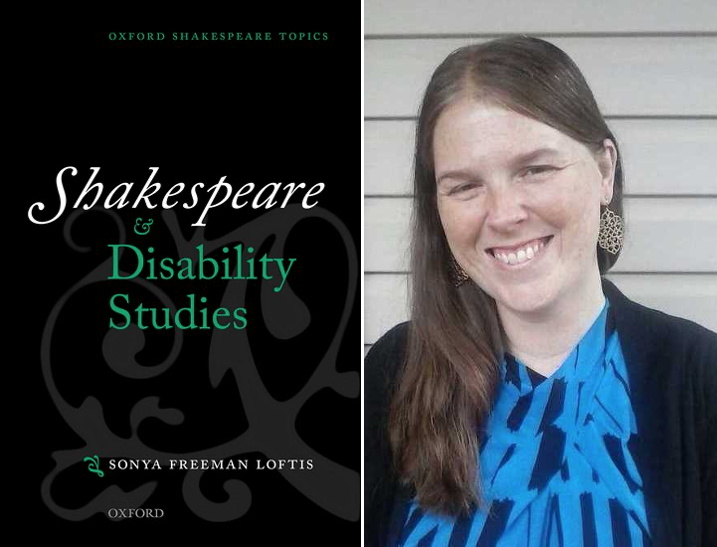This post is part of the Faculty Research Committee's author interview series. Today the FRC shares a conversation with Dr. Sonya Freeman Loftis about her new book, Shakespeare and Disability Studies (Oxford University Press, 2021).
______
How has your experience as a teacher affected your thinking about this project?
My students at Morehouse have played a key role in the development of this book. Not only do I teach Shakespeare on a regular basis, but I’ve also been teaching an Introduction to Disability Studies course during the J-mester and a First-Year Experience course on Disability and Race. Teaching disability studies classes has given me the opportunity to talk through a lot of the topics in this book with students. Although Shakespeare has a reputation among students for being “hard,” I actually find the disability studies courses much more challenging to teach. A lot of students come into these courses with very little prior knowledge about disability and disability studies. Many are surprised to learn that I have a disability and sometimes students respond to that information in unexpected ways. There are a couple of places in the book where I tell stories taken from classroom encounters or meetings during office hours. Those encounters and meetings helped me to think through some of the philosophical underpinnings of this book—essentially learning about and practicing disability theory by living it.
What inspired you to write this book?
Most approaches to disability studies in Shakespeare tackle the topic by analyzing a character in Shakespeare’s plays who might be seen as having a disability (usually King Richard III). As a Shakespearean with a disability, I got tired of that being the only approach. In this book, I’m interested in modern readers, audience members, performers, and scholars who have disabilities and how they relate to the larger world of Shakespeare studies. This makes the book extra-textual (I’m not reading Shakespeare’s plays, but rather the cultural apparatus that surrounds them) and (for a Shakespeare book) surprisingly modern.
What are the key lessons of Shakespeare and Disability Studies?
In this book, I focus on making theater accessible for people with disabilities, casting choices that include performers with disabilities, and situations in which Shakespeare’s text is used as therapy. I had the pleasure of interviewing theater practitioners at Shakespeare’s Globe, The Royal Shakespeare Company, and the Oregon Shakespeare Festival. I spent a lot of time thinking about how disability accommodations can be a form of art and a part of art. There are lots of ways in which performances are modified to create access, such as providing audio description (in which the show is described for blind audience members) or offering touch tours (in which blind audience members have an opportunity to touch props and costumes before the show). Those kinds of modifications to a performance can affect the way audiences experience and understand Shakespeare’s text. A second major take-away from the book is the struggle to define what real “inclusion” is. Everyone wants their program or event to be inclusive, but in reality, inclusion can be difficult to define and to achieve. I was especially interested in the way that some Shakespeare therapy programs bill themselves as “inclusive” while making people with disabilities feel excluded.
There is so much discussion nowadays about the importance of promoting diversity and inclusion, yet rarely is Shakespeare mentioned in these conversations. Why is it important to think about literary classics in this context?
One challenge for disability studies in general is that a lot of people still don’t think about and acknowledge disability as a form of diversity. This is especially true when it comes to mental disability. Many people tend to think about disability as an attribute someone has rather than as an identity, or as a community of people, with which one might self-identify. Mental disability is so stigmatized in our culture that it is hard for people to recognize and acknowledge it as a form of diversity.
Shakespeare has a really important role in the history of theater and the arts. The way we think is influenced by the books we read and the media we consume. Even more importantly, the way we think will be influenced by how we understand, talk about, and interact critically with what we read and consume. Shakespeare isn’t just a classic—he is an industry. Hamlet is the most frequently performed play in the world. Often, Shakespeare’s stories are reinscribed and rewritten in various venues (think about how many modern films, television shows, and books appropriate themes and motifs from Hamlet). If we are going to talk about mental disability, we can’t pretend that Hamlet’s so-called “madness” doesn’t influence the way modern people think about mental disability. In fact, Hamlethas been influencing depictions of mental disability for four hundred years. Thus, Shakespeare becomes a part of conversations in all kinds of areas that we wouldn’t ordinarily think of as being about Shakespeare at all.
______
Sonya Freeman Loftis, Ph.D., is a professor of English at Morehouse.

Tag(s):
Morehouse Faculty